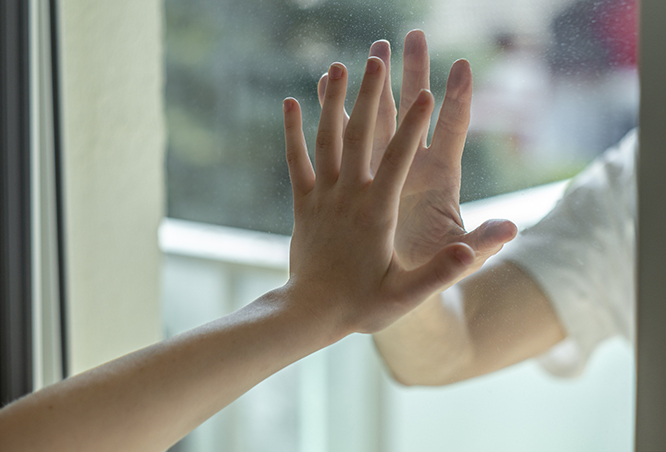Article by Fairfax County Health Department
(Posted 2020 September)

 Since March, many older adults have been kept safe in quarantine, limiting contact with family to Zoom or Facetime. Now, many long to see their children, grandchildren, and other family and friends, but are unsure of the risks.
Since March, many older adults have been kept safe in quarantine, limiting contact with family to Zoom or Facetime. Now, many long to see their children, grandchildren, and other family and friends, but are unsure of the risks.
Below are some scientific facts from the Centers for Disease Control and Prevention (CDC) to keep in mind as you make your decision whether or not to visit with family members who are older.
1. Older people are at higher risk for severe COVID-19 infection. According to the CDC, people in their 50s are at higher risk for severe illness than people in their 40s. Similarly, people in their 60s or 70s are, in general, at higher risk for severe illness than people in their 50s. The greatest risk for severe illness from COVID-19 is among those aged 85 or older.
2. People can spread the disease without having symptoms.
3. A negative COVID-19 test is not a guaranteed clearance for safely visiting with grandparents. If you test negative for COVID-19 by a viral test, you probably were not infected at the time your sample was collected. However, that does not mean you will not get sick. The test result only means that you did not have COVID-19 at the time of testing. You might test negative if the sample was collected early in your infection and test positive later during your illness. You could also be exposed to COVID-19 after the test and get infected as a result.
4. For grandparents in long-term care facilities, like nursing homes and assisted living facilities, visitors are restricted. Call ahead to ensure you know the facility’s policy prior to arrival. Ask if an outdoor visit is allowed.
 Delay or cancel your visit if you or other visitors:
Delay or cancel your visit if you or other visitors:
- Have symptoms of COVID-19.
- Have been exposed to someone with COVID-19 during the last 14 days, or if you had close contact with a person with COVID-19 - meaning you were within six feet of a person who had COVID-19 for 15 minutes or more during the days they had symptoms or two days before they had symptoms.
Stay outdoors for the visit. If that is not possible, meet in a well-ventilated space where you can have open windows or doors. Also, ensure the space is large enough to enable social distancing.
Spread out. Stay six feet apart.
No hugs and kisses. Avoid close contact. Wave instead.
Wear a mask.
Wash your hands and sanitize surfaces.
Communicate! Talk with your family members and understand everyone’s concerns before visiting an older parent or grandparent. This is not a time for surprise visits. Planning ahead keeps everyone on the same page.
And, always remember - you are safest at home.
Call the Health Department Call Center at 703-267-3511 with coronavirus questions; open weekdays 9 a.m.-7 p.m. and weekends 9:30 a.m.-5 p.m.
Text FFXCOVID to 888777 to receive updates from Fairfax County about COVID-19; text FFXCOVIDESP to 888777 for updates in Spanish.
Email questions to FFXcovid@fairfaxcounty.gov, Monday-Friday, 8 a.m.-6 p.m.
Visit Fairfax County COVID-19, a one-stop online resource for information.
Learn more about COVID-19 on the Health Department Coronavirus webpage or Frequently Asked Question webpage.
Follow the Fairfax County Government Facebook page and Health Department Facebook page.
This article is part of the Golden Gazette monthly newsletter which covers a variety of topics and community news concerning older adults and caregivers in Fairfax County. Are you new to the Golden Gazette? Don’t miss out on future newsletters! Subscribe to get the electronic or free printed version mailed to you. Have a suggestion for a topic? Share it in an email or call 703-324-GOLD (4653).

